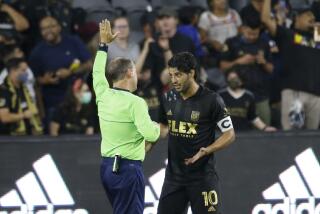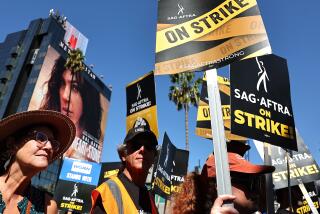NFL PLAYERS STRIKE: DAY 3 : THE TALKS : Negotiations Are Stalled as Games Are Officially Stopped
PHILADELPHIA — Once-optimistic player and union negotiators awoke Thursday after their near all-nighter and quickly discovered that the National Football League strike is alive and well, which is more than you can say for these late, great labor talks.
By afternoon’s end, Tex Schramm and Dan Rooney, members of the Management Council’s executive committee and imported specifically to explain the owners’ side of the pivotal free agency issue, were long gone.
Said Schramm as he checked out of his hotel: “I don’t think either side broke (the free agency talks) off. I think they just died of momentum.”
Earlier in the day, the NFL office announced the postponement of this weekend’s games. Had both sides been close to an agreement, it is likely the league would have attempted to salvage Week 3 rather than lose television and ticket revenue.
Instead, it appears that the owners, for now, are committed to their plan of using non-union players until the strike is settled.
Schramm and Rooney weren’t the only ones to hail taxis to the airport. Raider Brian Holloway, who serves as vice president of the NFL Players Assn., left his hotel when it became apparent that negotiations were lurching to an unexpected stop. He considered the trip a wasted exercise.
“I think it became very apparent that we were watching a staged production,” Holloway said. “When (management) said the points they had to say on their agenda, they were not willing to entertain good-faith negotiations.
“I’m going home and get on the picket line with the other guys,” he said. “(The strike is) going to last until it starts costing the owners money. They want to play hardball, so be it.”
Shortly thereafter, Gene Upshaw, executive director of the NFL Players Assn., and Jack Donlan, management’s chief negotiator, emerged from an afternoon bargaining session with nothing to report except, of course, an impasse.
“At this point, we have not made any progress,” Upshaw said.
Said Donlan: “It may be time to pull back and re-evaluate the respective positions.”
Upshaw and Donlan resumed talks but recessed early Thursday evening. They will meet again this morning at 9:30, though no one expects a breakthrough.
The warning signs were obvious enough. Even before Donlan began the first of several sessions with Upshaw, he chided the union for supposedly waiting too long to discuss substantive issues, mainly free agency. According to Donlan, too much time was spent on minor concerns, such as the wording of club discipline codes.
“These are the kinds of things that should have been settled three, four months ago rather than two, three days into the strike,” Donlan said.
Said Doug Allen, the union’s assistant executive director: “The fact that we haven’t made any progress will only make (the players) angrier, only make them stronger.”
The news of Schramm’s and Rooney’s departure followed the announcement to cancel this weekend’s games. Schramm, president of the Dallas Cowboys and a strict, hard-line management type, and Rooney, president of the Pittsburgh Steelers and considered more moderate, had been asked to attend the negotiations by Upshaw and union officials.
They came. They saw. They left, dissatisfied with the NFLPA’s insistence on a significantly different system of free agency.
“Well, if this is . . . the only issue that they’re hedging their strike on, then it could be a long strike,” Schramm said.
That isn’t exactly what Upshaw and his executive committee were hoping to hear. They had traveled to Philadelphia in hopes of convincing Donlan and management that true free agency--unrestricted movement from one team to another for players with at least four years of service--must be granted to avert a prolonged strike.
Without going so far as to suggest that Upshaw should read his lips, Donlan, with the enthusiastic support of NFL owners, said no--again.
“We are not prepared to do away with the system,” he said.
Nor are they prepared to discuss a reported compromise proposal that would call for:
--Retaining the present system during the first seven years of a player’s career.
--Granting a team only the right of first refusal on, but not compensation for, players with 8-10 years of service who become free agents.
--Allowing players with 11 years or more of service unrestricted free agency.
Management’s lack of interest in such a plan has something to do with its origin. It reportedly was put forth by Raider owner Al Davis. Donlan called it “the West Coast proposal” and added that even if Upshaw had submitted the idea, it would have been rejected immediately.
Actually, Upshaw said, any plan involving free agency was likely to be ignored by Donlan.
“(Management) told us if it was 25 years . . . if it was 30 years (until a player reached true free agency eligibility), they wouldn’t give one guy freedom,” he said. “So we’ve got a problem.”
Donlan wants the union to accept a liberalized version of the owners’ system. He has proposed, depending on a player’s earnings and experience, that compensation requirements be relaxed. For instance, under the existing plan, a fourth-year player making $330,000 is worth a No. 1 and a No. 2 draft choice. Few teams, if any, the union argues, are willing to pay that price.
So the strike continues as members of union and management head for home. All that’s left in Philadelphia are Donlan, Upshaw and, it appears, a walkout destined to grow much older.
More to Read
Go beyond the scoreboard
Get the latest on L.A.'s teams in the daily Sports Report newsletter.
You may occasionally receive promotional content from the Los Angeles Times.










